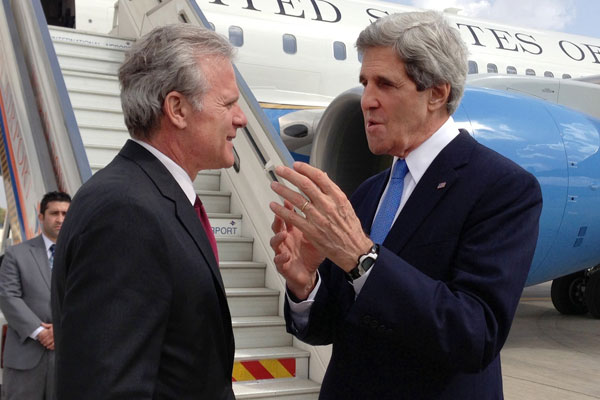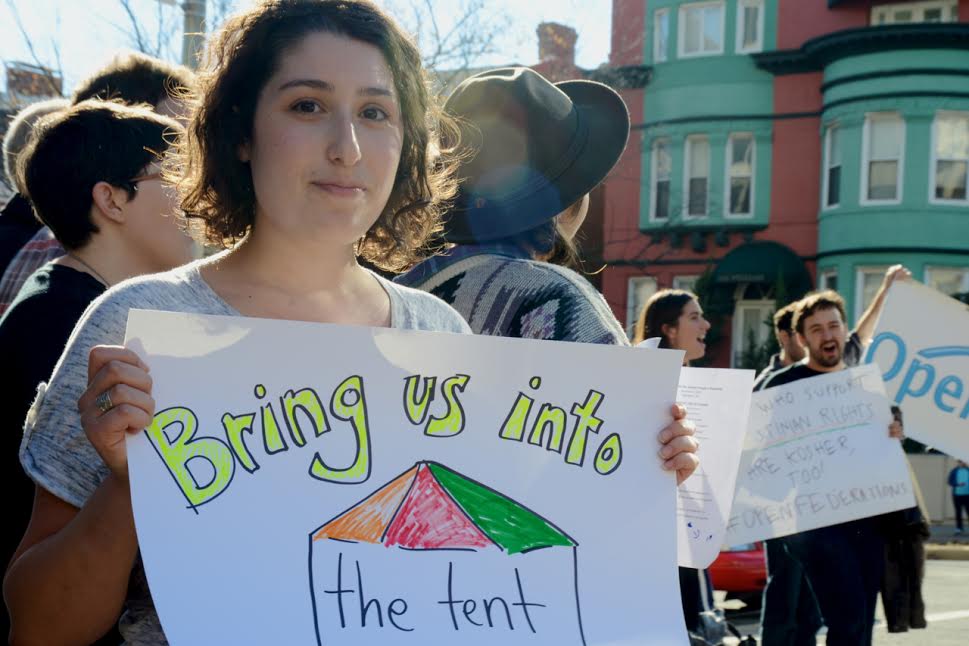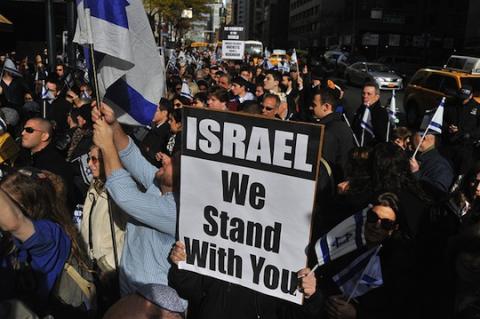Last summer Michael Oren, who served as Israel's ambassador to the United States from 2009-13, blithely offended virtually the entire policy, journalism and government elite in New York City and Washington, D.C. with a series of accusations directed at President Obama and liberal Jewish Americans.
In a nutshell, Oren accused Obama of deliberately sabotaging relations with Israel in order to achieve the goals of ingratiating himself with the Arab Muslim world and negotiating a nuclear deal with Iran. He also suggested the president was soft on terror - because he had Muslim daddy issues (his father, who had not been present when he was growing up, was a Kenyan Muslim). Oren also characterized American Jews who criticized Israel as anti-Israel and/or insufficiently Jewish.
Oren offered up his frank opinions and amateur psychoanalysis in a controversial Wall Street Journal op-ed and in a Foreign Policy essay - both of which acted as pre-publication publicity for his memoir, "Ally."
The response of the foreign policy people who figure so prominently in the discourse about Israel in the so-called Acela Corridor (the name of the rapid train that links New York and D.C.) was one of outrage and betrayal. They had regarded Oren as an ally who shared their worldview. Instead he had ripped off his mask of moderation to reveal a strident nationalist who was carrying some heavy baggage packed with Hebrew warrior fantasies, a Holocaust obsession and a fortress mentality.
But while prominent members of the inner policy circle like Martin Indyk challenged Oren's accounts of his dealings with the Obama White House in testy exchanges on CNN, almost no-one addressed the former ambassador's curiously clich,d personal narrative, which is like a plot ripped straight from a Leon Uris novel. A nerdy, physically unprepossessing Jewish boy grows up in suburban America, relentlessly bullied at school by anti-Semites. As a teenager he becomes intensely aware of the Holocaust, vows to make sure it never happens again, becomes an ardent Zionist and works hard to save his money so he can immigrate - or make aliyah - to Israel, where he magically morphs into a handsome combat warrior who wades heroically into battle and wins the love of the pretty girl who's probably a bit out of his league.

For many older American Jews, Michael Oren's life story is a familiar trope that represents their idealization of Israel.
U.S. State Dept photo
He also runs the risk of taking matzos and religious paraphernalia to Jewish refuseniks in the USSR, returns to Israel, fights in a war, marries his girl and ultimately becomes a distinguished diplomat, continuing to do combat for Israel in the international policy arena.
Any American (or Canadian) Jew over the age of 45 who attended parochial day school and/or Jewish summer camp knows this narrative by heart. We all grew up monitoring the years the Refuseniks had been in the gulag, attending rallies to free Soviet Jewry, listening to Holocaust survivors tell their personal stories at school on remembrance day, hearing our parents and grandparents talk about the petty anti Semitism they had experienced in the 1940s, 50s and 60s - about university quotas on Jewish students, the upper class neighborhoods where home owners had an agreement not to sell to Jews, law firms that wouldn't hire Jews and country clubs that barred Jewish members.
It is this generation of American Jews, the baby boomers who are old enough to remember the exhilaration and pride engendered by the stunning victory of the Six Day War in 1967, who respond automatically to the tropes in Oren's artful narrative. Jews born in the 1980s, the ones often called "millennials," are far less likely to relate.
We don't care what you think
But while American Jews of a certain age might respond with reflexive nostalgia to the way Oren writes about his childhood and his Zionist aspirations, the angry reactions to his accusation that Obama betrayed Israel and his suggestion that real Jews should not criticize Israel, illustrates that he is out of touch with shifting attitudes in the American Jewish community. Oren seems particularly to have forgotten that most American Jews vote Democrat, and that nearly 70 percent of them cast their ballots for Barack Obama in 2008 and again in 2012.
Or perhaps Oren and his ilk don't really care, but are sufficiently diplomatic to refrain from saying so. Avigdor Liberman, the former Israeli foreign minister who leads the hawkish Yisrael Beiteinu party, does not allow such niceties to affect his behavior. At the Saban Forum held in Washington the first week of December, The Atlantic's Jeffrey Goldberg told Liberman that Jewish university students were finding it increasingly difficult to defend Israel's policies on campus. Liberman's response, delivered with his trademark lack of facial expression: "I don't care." Then he added: "I really don't care."
Goldberg, who has in recent years positioned himself as a gatekeeper of the Israel discourse in Washington, was shocked. So was the audience. Not only because Liberman expressed himself so rudely, but also because he had bluntly reinforced what had already become increasingly clear over the past two years or so: that Netanyahu, Bennett and the rest of Israel's ascendant pro-settler, right-wing, political elite are neither politically nor ideologically aligned with the mainstream Jewish American community. With Netanyahu in power, the Prime Minister's Office in Jerusalem has become a sort of branch of the Republican Party. But the decisive majority of American Jews identify strongly with the Democratic Party.
A conflict of values

Supporters of Jewish Voice for Peace march protesting Israel's offensive on Gaza, August 2, 2014. JVP saw a surge in membership following the 2014 Gaza war.
For American Jews of the baby boomer generation, the widening gap between Israel, the country to which they have to a great extent outsourced their Jewish identity, and the United States, which is their home, has raised the specter of warring dual loyalties. They can't really identify with Netanyahu, given his racist comments, far-right governing coalition and overt hostility to Obama, but Israel as a place and an idea is very important to them. That is why they were likely to condemn Netanyahu's election day race baiting, which flew in the face of their liberal values, but support the 2014 Gaza war, because the army and the Israeli media said it was a war of defense.
But for millennial American Jews, the 2014 Gaza war was a watershed in their evolving attitude toward Israel. The massive destruction in Gaza and the huge gap in the death toll, with nearly 1,900 Palestinian casualties (including over 500 children) compared to 67 Israeli dead, left a powerful impression. After the war, the progressive Jewish Voice for Peace saw a surge in membership. According to Executive Director Rebecca Vilkomerson, the number of JVP chapters around the country has doubled since the summer of 2014. The number of followers on social media has tripled.
For the establishment Jewish community, defined by their liberal social values and by their generally uncritical attitude toward Israel - which is now being severely tested by Netanyahu's policies - the JVP with its BDS-supporting ways is anathema. It is still infinitely more acceptable for a Jew to question the existence of God in synagogue than to criticize Israel. And while JVP is growing, its paid membership is now at 10,000 - which is not huge. But rapid growth indicates there are widening fissure lines in the community's once solidly unified base.
Out of touch white men
For the Washington insiders, though, it's not so easy to follow the path of those fissure lines. The policymakers take their cue from a small group of insiders who are nearly all Jewish men in their 50s and 60s. They are the same men who make up nearly every think panel and CNN news analysis panel. Martin Indyk, David Makovsky, Aaron David Miller, Dennis Ross, Philip Gordon, Jeffrey Goldberg. When they want to hear from an actual Israeli, they might call in Ari Shavit or a retired Shin Bet director like Ami Ayalon. It's not that there's any shortage of female experts, non-Jewish experts, younger experts or progressive experts. But they are not part of the inner circle and they are not policy influencers. So very few people outside the Beltway hear from or about them.
Meanwhile this small group of middle aged men who really do not understand the complexities of the situation on the ground, either in Israel-Palestine or in the American Jewish community, are to a large extent dominating and influencing the conversation about Israel-Palestine at a very high level in D.C. The result is strikingly discordant speeches like the keynote Joseph Biden gave at the J Street conference two years ago, or the one Samantha Power gave at the HaaretzQ conference in December. Both delivered AIPAC speeches to restless progressive audiences that were uninterested in platitudes about the only democracy in the Middle East and faux nostalgic references to Israel's iconic late leaders from a bygone age, like "Golda."
i
American leaders of late have expressed their understanding of Israel through faux nostalgic references to its idealized past. Pictured: Young American Jews take part in the Jewish People's Assembly outside the General Assembly of the Jewish Federations of North America, Washington, D.C., November 8, 2015.
photo by Gili Getz // +972 MAgazine
There's another factor that must be taken into account in analyzing the potential ramifications of the fissures and shifting attitudes toward Israel in the American Jewish community. And that is that for the majority of Jewish Americans, Israel is not a top issue. A 2013 Pew study showed declining interest in both Israel and Judaism among the 30-and-under generation. Within a decade or so, members of Congress and presidential candidates might no longer have to campaign on Israel. Or Israel might become an issue that dominates with right-wing Evangelical Christians far more than it does with Jewish voters.
In 2014 and 2015, the gap in ideological views between Democratic Jews who are affiliated with the organized Jewish community and the Israeli political leadership's Tea Party-esque views became impossible to ignore. Wars can be justified in the name of Israel's security, but not so when it comes to race baiting, book censorship and attempts to shut down human rights NGOs. For most American Jews, Israel is more of an idea than a reality. They don't speak Hebrew, they don't visit the country more than once or twice in a lifetime (if that) and their knowledge of its society is shallow and limited. But the country is important to them, and not just as a symbol. The idea of a safe haven for an insecure people that has been displaced and subjected to genocide is very significant.
But now many are grappling with the existential crisis that occurs when the insurance policy and the identity symbol conflict with one's core values. As one friend put it, he's not religious at all and he doesn't speak Yiddish or Hebrew, so his identity was based on the Holocaust and Israel. "And now," he said, "What am I going to pass on to my kids about their heritage?" That question could well be one of Netanyahu's most enduring legacies to the diaspora.
[Lisa Goldman has been writing about the Middle East in general, Israel-Palestine specifically for well over a decade. Now, since moving from Jaffa to Brooklyn a couple of years ago, She writes about the US-Israel bilateral relationship and about the relationship between the American Jewish community and Israel.]


Spread the word